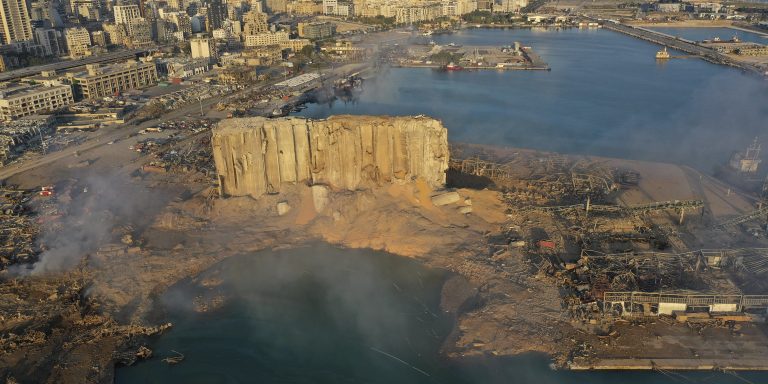INTELBRIEF
August 25, 2020
IntelBrief: Lebanon Crisis Deepens After Blast, COVID-19 Spread

Bottom Line Up Front
- The blast in Beirut on August 4th has devastated Lebanon, with over 200 killed, 6,000 injured, and 300,000 rendered homeless, all while an economic crisis rages and the COVID-19 pandemic spreads.
- The aftermath of the blast has seen the government resign and parliament impose a state of emergency, a move that has angered some citizens and concerned many worried about the erosion of civil liberties.
- COVID-19 has surged in Lebanon, setting new records for infection counts in the country, all while the capital’s reduced hospital capacity struggles to contend with the effects of the blast.
- French President Emmanuel Macron has called for political reforms, an investigation, and an acceleration of aid deliveries to Lebanon, but the country’s underlying economic crisis shows no signs of abating.
Lebanon’s converging public health, economic, and political crises have intensified in the weeks since the warehouse explosion in Beirut’s port on August 4th that claimed over 200 lives, injured over 6,000, and left perhaps 300,000 homeless. Lebanese officials have said that the blast was caused by 2,750 tons of ammonium nitrate being stored unsafely at the port. The ammonium nitrate had been confiscated from the Moldovan-flagged ship MV Rhosus in 2013, when it had been on its way from the Republic of Georgia to Mozambique. En route, it made port in Beirut where officials deemed it unseaworthy and held it, apparently without taking adequate safety measures. The blast was powerful enough to be felt in Cyprus, 150 miles away. Over half of Beirut was affected, with economic losses estimated at $15 billion on top of the devastating human toll. Several hospitals and Lebanon’s only large grain silo were destroyed.
The aftermath of the blast has caused upheaval in Lebanon’s government, with Prime Minister Hassan Diab, the entire cabinet, and several MPs resigning. President Michel Aoun has asked Prime Minster Diab and the government to remain in place in a caretaker capacity until a new government can be formed, which may be weeks or months from now. And parliament has approved a state of emergency, empowering the army to curb freedom of speech, assembly, expression, and the press, with a broad mandate to arrest anyone deemed a security threat. Popular anger has swelled, with many Lebanese blaming endemic corruption and government negligence for the explosion and the attendant damage. Protests, ongoing since late last year, have resumed with new vigor now that the blast’s damage has compounded Lebanon’s economic woes. Rights groups have expressed concern over the state of emergency and the attendant curtailment of civil liberties at a time of great popular anger, economic crisis, and social instability.
The coronavirus in Lebanon has spread since the blast. Record-high case counts are being set, while the country’s total cases approaches 13,000 and the death toll has eclipsed 100 and is rising. Beirut hospitals that were not destroyed have been overwhelmed with blast victims, limiting their ability to handle COVID-19. Half of all medical centers in Beirut were put out of service by the blast. The country’s caretaker health minister has called for a two-week lockdown to control the spread of the virus, a prospect made immensely more complicated by the sudden and devastating reduction of the capital and largest city’s usable housing stock. The Soufan Center captured the stories of doctors, refugees, and others affected by the overlapping crises of COVID-19 and Lebanon’s political and economic struggles as the virus continues to spread.
The international implications of the blast and its effects on Lebanon are still coming into view. French President Emmanuel Macron visited Beirut shortly after the explosion, calling for political reforms and an international investigation into the causes of the explosion on the one hand, and for the international community to fast-track aid to Lebanon on the other. Along with the United Nations, Macron helped convene a video conference with international leaders to speed up assistance to the stricken country. Several countries, including France, Germany, and the UK, have pledged emergency aid. But while aid is necessary to alleviate widespread suffering, many Lebanese hold that the root of the country’s dysfunction is in the sectarian system of government, in which various religious groupings divide up power, and are reluctant to give up what they have gained under the status quo. Perhaps complicating the picture is the verdict of the UN Special Tribunal for Lebanon in the case of the assassination of former Prime Minister Rafik Hariri in 2005, in which one Hezbollah member was convicted and three others cleared. All of the defendants were tried in absentia, as Hezbollah refused to disclose their locations, and Hezbollah leader Hassan Nasrallah has said that he will refuse to turn over any member—a situation that could complicate the formation of the next government, as Saad Hariri, son of Rafik Hariri, is a candidate to lead it.